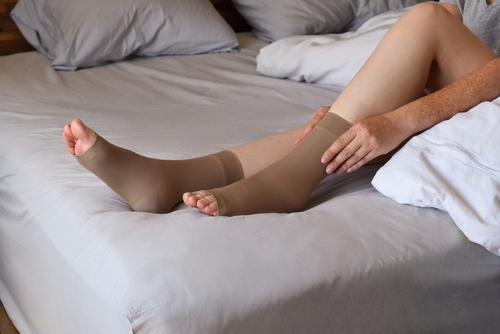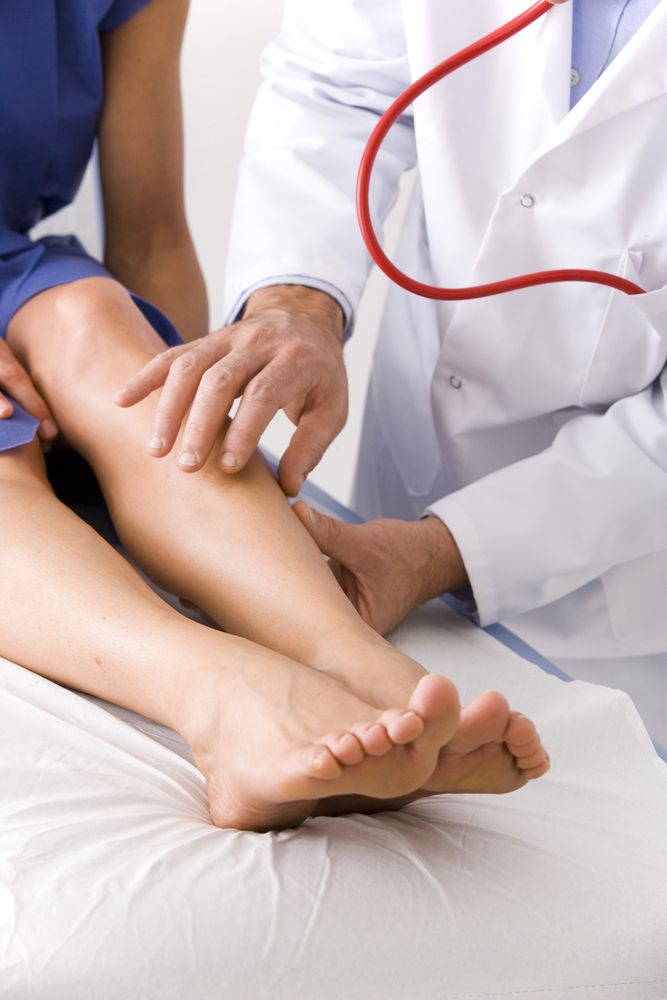
What is Leg Swelling?
While our legs may temporarily swell from inflammation, like allergic reactions or a long day on your feet, chronic leg swelling can mean you have venous insufficiency. Weak and malfunctioning veins cause venous insufficiency; however, chronic venous insufficiency (CVI) is an encompassing category of medical conditions.
In addition to leg swelling, CVI can lead to varicose veins, spider veins, and deep vein thrombosis, to name a few. While mild cases of leg swelling are not a serious health threat, more severe cases should receive treatment before progressing. If you have chronic leg swelling that prevents you from daily activities, please schedule an appointment with our board-certified vascular doctors. The VeinSolutions teams in Flint, Michigan, and Lapeer, Michigan, can provide in-depth screenings and the correct treatment plan.
What Causes Leg Swelling?
Leg swelling occurs when veins and valves fail to work correctly. Valves in the veins open and close when the heart pumps to push blood toward the heart. These valves prevent blood from flowing backward. If vein walls or valves become weak, they fail to push blood back toward the heart. As a result, blood pools around the legs and ankles and causes them to swell.
Gravity plays a role in venous insufficiency, which is why symptoms often develop in the legs, feet, and ankles. Furthermore, a long day of sitting or standing without much blood flow can worsen symptoms.
Risk Factors For Developing Leg Swelling
Gender
Women are more likely to have swollen legs than men since they have more of the hormone progesterone. This hormone can relax vein walls and subsequently cause blood to pool. In addition, birth control pills and hormone therapy can increase the amount of this hormone inside a woman’s body, exacerbating the issue.
Menopause
Lower estrogen levels, a side effect of menopause, can weaken vein walls and valves. Additionally, lower estrogen levels make it harder to burn fat, which increases pressure on veins and leads to swelling.
Age
As we age, our connective tissue breaks down, and we lose elasticity in our blood vessels. With too little elasticity, connective tissues cannot effectively push blood toward the heart. The older we are, the higher our risk for CVI and swelling legs.
Obesity
Extra weight puts pressure on the veins, which makes them more susceptible to swelling. Furthermore, obesity can lead to loss of mobility, which can contribute to poor vascular health.
Pregnancy
Pregnancy strains your vascular system because the expanding uterus compresses the main vein and reduces blood flow to the heart. Also, your blood volume and heart rate increases to nourish your baby, adding more strain on your veins and valves.
Job Types
Jobs that require long periods of standing or sitting contribute to swollen legs. In addition, inactivity and stress can cause blood to pool and accumulate in your legs due to gravity. Jobs requiring long hours of standing could also cause vein issues from blood compressing downward into the legs.
Lifestyle Choices
Lifestyle choices like a diet high in sodium and little exercise can put you at risk of developing damaged veins. Sodium retains water, which leads to swelling. Tight clothing and high heels can also put unnecessary pressure on the body, blocking effective blood flow through your veins.
Medical Issues
Previous damage to the leg from an injury, surgery, or blood clots can contribute to a higher risk of leg swelling. In addition, other medical issues, like kidney disease and high blood pressure, weaken the walls of blood vessels and increase the pressure in the legs.
Smoking
Smoking tobacco causes vasoconstriction. When this happens, vein walls narrow, and blood flow to the heart becomes more strenuous, adding stress to vein walls. In addition, the carbon monoxide in cigarette smoke can also cause veins to become inflamed. Over time, this, too, will damage vein structure and cause swollen legs.

Varicose Vein Treatment Options
There are many varicose vein treatment options available to you in Michigan. Learn more about the options available to you at VeinSolutions.
- Surgery: In severe cases of chronic leg swelling, a doctor may suggest removing problem veins that cause the swelling. The patient will be under general anesthesia. Also, in most cases, the patient can go home the next day.
- Litigation and Stripping: A surgeon locates a problem vein causing the issue and then cuts at the top and bottom of the vein. The top of the vein is cut and sealed. Then, a thin wire is threaded up the vein and pulled out, pulling the entire vein with it.
- Sclerotherapy: A surgeon injects a chemical into small or medium-sized problem veins. The chemical collapses the veins, and they close after a few weeks. Some veins need to be injected more than once for full results.
- Radiofrequency Ablation: The doctor makes a small cut on your leg, and then a narrow tube is put in your vein. The doctor uses this to inject radiofrequency energy into the vein, which heats its walls. The energy causes the vein to collapse, and the varicose veins dissolve.
- Endovenous Laser Ablation: A surgeon inserts a catheter into your vein. A laser is then threaded through the catheter and positioned at the top of the vein, which will heat the vein. This heat energy will seal it shut.
- Transilluminated Powered Phlebectomy: For the surgeon to see each vein, they need to make an incision to thread a light through. Then, the surgeon cuts the target veins and removes them through the incision with a suction device.
- Improving blood flow: If chronic leg swelling is due to a vascular issue, a few at-home treatments can help ease symptoms for mild cases.
- Compression stockings: Prescription-strength compression stockings support vascular health by encouraging blood flow up the leg and into the heart. The compression prevents blood from pooling and causing the legs to swell.
Medication: A doctor may prescribe medicines that increase blood flow in addition to compression therapy.

Schedule A Vascular Health Screening in Flint or Lapeer, MI
Get in contact with our highly specialized vascular doctors and surgeons at VeinSolutions. With multiple locations in Michigan, our team is ready to help ensure your circulatory health isn’t overlooked.
